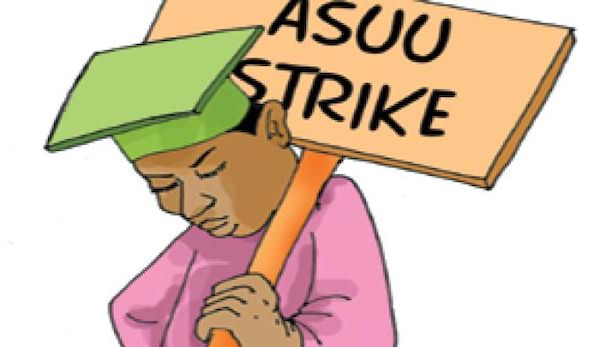Since the return of democracy in 1999, Academic Staff Union of Universities (ASUU) has gone on strike for over four years cumulatively – a period long enough to bag a bachelor degree in Nigeria, United States, United Kingdom, among other countries.
ASUU recently declared a four-week warning strike which elapsed on March 14 without any resolution reached with the government, leading to an eight-week extension.
If the two months runs out as planned, the union would have embarked on strikes for about 1,603 days or four years and 39 days in 23 years.
In Nigerian universities, there are a number of courses in Arts, Social Sciences and Education one can study and earn a bachelor degree in any of them within the four years’ strike period.
Such courses include Language, Literature, Religion, Business Administration, Sociology, Public Administration, Accounting, Economics, and so on.
Although the academics have justified the recurring strikes on the failure of the Federal Government to meet their demands which many described as valid, students at different times have ultimately been at the receiving end.
As a result of the incessant industrial actions, many students have had to spend one or two extra years in university, enduring all the setbacks that come with the programme.
ASUU is demanding funding for revitalisation of public universities, Earned Academic Allowances, renegotiation of 2009 ASUU-FGN agreement, University Transparency Accountability Solution; payment of promotion arrears, the inconsistencies in Integrated Payroll and Personnel Information System Payment, among others.
The union lamented that none of these demands, as contained in the Memorandum of Action signed with the Federal Government in 2009 and renegotiated in 2020, had been met.
Explaining why the current strike was extended by eight weeks, ASUU President, Prof. Emmanuel Osodeke, had in a statement said the Federal Government failed to satisfactorily address all the issues raised in the 2020 FGN/ASUU MoA within the one-month warning strike.
“NEC (National Executive Council) acknowledged the intervention efforts, in various ways, by patriots and friends of genuine national development (students, parents, journalists, trade union leaders, civil society activists etc.) to expeditiously resolve the crisis which government’s disposition had allowed to fester.
“However, ASUU, as a union of intellectuals, has historic obligations to make government honour agreements. NEC, having taken reports on the engagements of the Trustees and Principal Officers with the government, concluded that the government had failed to satisfactorily address all the issues raised in the 2020 FGN/ASUU Memorandum of Action within the four-week roll-over strike period and resolved that the strike be rolled over for another eight weeks to give government more time to address all the issues in concrete terms so that our students will resume as soon as possible,” Osodeke had said.
ASUU strike since 1999
The union’s run of strikes began shortly after the former President Olusegun Obasanjo assumed office in 1999. It lasted five months which was more than a semester of about four months. ASUU embarked on another three-month strike in 2001 over the sacking of 49 lecturers at the University of Ilorin, who were reinstated years later.
The following year, in December, ASUU went on a two-week strike over the government’s failure to implement agreements reached with the union. In 2003, a six-month strike made many students then to spend an extra year to complete their studies.
Two years after, in 2005, the lecturers were on strike for two weeks, followed by a three-day warning strike the next year. In 2007, 2008 2009, 2010 and 2011, the union downed tools for three months, one week, four months, five months and two months respectively.
This means ASUU was on strike for one year and two months within just five years, thereby constraining students then to spend a year more than the expected duration of their programmes.
As a result of the government’s failure to review the retirement age of professors from 65 to 70, approve funding for revitalisation of the university system and increase education budget to 26 percent, the union resumed strike in 2013, lasting five months and 15 days.
Another indefinite strike was declared on August 17, 2017 but called off within a month only for it to resume the following year and lingered for three months before it was suspended.
The longest of the strikes was in 2020 which lasted over nine months coupled with the Covid-19 pandemic. The ongoing strike started on February 14, 2022.
Way forward
With 16 strikes in 23 years, many analysts have argued it’s high time the union restrategised and came up with more pragmatic ways of driving home its demands as the strikes have had little or no positive impact.
A retired federal permanent secretary and professor in the National Institute for Policy and Strategic Studies, Tunji Olaopa, in a recent article maintained that ASUU was pursuing “unwinnable battles,” even while admitting that the Nigerian university system is in a shambles and the union has a compelling case to make.
He stated, “The real point to make is that if ASUU ever hopes to win this battle for the revamping of the university system, it must first recalibrate its tactics….ASUU and the government, together with other relevant stakeholders, including the National Universities Commission, have to get involved in a conversation around two fundamental issues.
“The first is the matter of university autonomy. This is a significant aspect of the entire trouble of making the university system functional as a source of sound education and human capital development. This is an issue ASUU must lay on the table and force government’s hand in seeing it through to a logical conclusion. Autonomy demands that each federal university will agree on the constitution of a strategic governing council that will then deliberate on strategic change management dynamics around which the university can become administratively self-sustaining and academically excellent.
“The second issue, a correlate of the first, concerns the idea of education funding, and the appropriate models that could be considered. It might just be in Nigeria alone that the government fully funds higher education. This is seriously unsustainable. And definitely not with the economic recession caused by oil price volatility and accentuated by the COVID-19 pandemic. All across the world, education funding models derive from tuition and fees, operating grants, auxiliary enterprises, endowment and other gifts and investments.”
Also, an associate professor in the Department of Political Science and Public Administration, Baze University, Abuja, Dr Hakeem Baba-Ahmed, said if the federal government must maintain ownership of its universities, it must yield substantial autonomy to their decision-making and management organs.

 Join Daily Trust WhatsApp Community For Quick Access To News and Happenings Around You.
Join Daily Trust WhatsApp Community For Quick Access To News and Happenings Around You.


